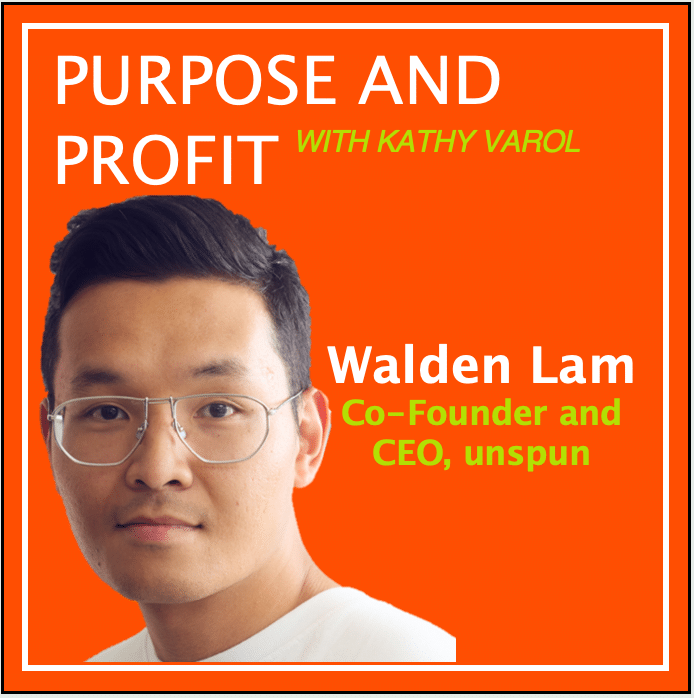Show Notes:
Walden Lam is the co-founder and CEO of unspun, whose mission is to reduce global human carbon emissions by 1%. To get there, unspun is focused on zero-waste production and circular reuse for clothing. In their aim to remake the fashion industry, unspun had to remake how clothes are made. They started with digital fit jeans, and then created VEGA, a 3D weaving technology that changes how clothes are made to reduce waste, increase efficiency, and make clothes easier to recycle back into raw materials. unspun is also a certified B corp.
Prior to founding unspun, Walden led growth strategies at Lululemon, worked with innovative companies at IDEO, and invested in early-stage ventures.
I learned about unspun through Unreasonable Ventures, and in full transparency, I was so impressed with the change they’re trying to create in the retail industry that my husband and I became investors in the company.
In this episode we discuss:
✅ How a truly ambitious goal can require a foundation of collaboration
✅ The waste problem at the heart of the global fashion industry
✅ What retail can learn from the local food movement
3 episode takeaways (listen to the full episode for a lot more gems!):
1️⃣ As the unspun website says, “It’s a simple enough idea. Start with thousands of individual yarns, and directly weave them into seamless 3D textiles. Think 3D knitting… but 10X faster and 5X cheaper. By skipping entire steps in the conventional cut-and-sew process, Vega™ opens the door to an entirely new world of on-shore and on-demand production for woven apparel.”
***
2️⃣ Oversight of a global supply chain for a single company can be very difficult because so much of the production process for a single product is outsourced to other companies. It’s not uncommon for clothing items to pass through the hands of 20 to 50 different suppliers, manufacturers, and intermediaries from the raw material stage (e.g., fabric production) to the finished product (e.g., retail distribution). When modern-day slavery or other issues show up in a company’s global supply chain, they are (and should be) held accountable. But it’s important to realize it can be difficult to monitor.
What’s unique about unspun is they take the raw material of yarn and turn it into a finished product, all under one roof. As a partner to other clothing brands, unspun’s model drastically simplifies supply chain oversight.
* * *
3️⃣ California Governor Gavin Newsom recently signed two landmark climate-related disclosure bills into law. The bills will require large companies in the US to disclose their full value chain emissions and report on climate-related financial risks. These laws would introduce the first major mandatory climate-related reporting obligations for many US companies and go beyond proposed SEC rules, including both public and private companies.
This increased visibility into scope 3 emissions will change the conversation around global supply chains, giving a huge benefit to companies like unspun that have figured out how to bring manufacturing closer to the end consumer.
References:
- Connect with Walden on LinkedIn
- unspun
- Ellen Macarthur Foundation’s The Jeans Redesign
- Read more about the unspun/Eckhaus Latta collaboration here
- European Commission press release on Extended Producer Responsibility for textiles

